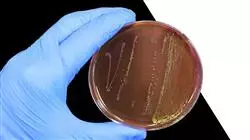University certificate
The world's largest faculty of medicine”
Description
Through this 100% online Postgraduate certificate, you will use Artificial Intelligence to prevent and control infections in clinical settings"

The rapid identification of pathogens and the selection of appropriate treatments are fundamental pillars in the fight against infectious diseases. With the rise of antimicrobial resistance, these tasks have become increasingly complex. Artificial Intelligence has become an effective tool to address these problems, enabling more accurate identification of pathogens and their resistance profiles. Faced with this reality, practitioners need to acquire advanced skills to get the most out of tools such as Big Data, Machine Learning or Deep Learning.
Faced with this, TECH implements a pioneering Postgraduate certificate in Artificial Intelligence in Clinical Microbiology and Infectious Diseases. Conceived by specialists in this field, the academic itinerary will delve into the emerging areas interrelated with this technology, among which data science and Big Data stand out. In this sense, the agenda will analyze how Machine Learning tools can be used to improve epidemiological surveillance and develop antimicrobial therapies that improve the quality of life of patients. In addition, the program will include a disruptive topic on the future of Artificial Intelligence in Microbiology and will encourage graduates to offer innovative solutions.
On the other hand, this program is based entirely on a 100% online modality, making it easy for physicians to plan their own study schedules to experience a fully efficient catch-up. In addition, professionals will enjoy a wide variety of multimedia resources designed to promote dynamic and natural teaching. To access the Virtual Campus, all professionals will need is a device with Internet access (including their own cell phone). They will also be supported at all times by an experienced teaching staff, who will resolve all the doubts that may arise during their academic itinerary.
Download all the contents of this Postgraduate certificate, such as specialized readings and multimedia material, even after you have completed the program"
This Postgraduate certificate in Artificial Intelligence in Clinical Microbiology and Infectious Diseases contains the most complete and up-to-date scientific program on the market. The most important features include:
- The development of practical case studies presented by experts in Microbiology, Medicine and Parasitology.
- The graphic, schematic and eminently practical contents with which it is conceived gather scientific and practical information on those disciplines that are indispensable for professional practice
- Practical exercises where the self-assessment process can be carried out to improve learning.
- Its special emphasis on innovative methodologies
- Theoretical lessons, questions to the expert, debate forums on controversial topics, and individual reflection assignments
- Content that is accessible from any fixed or portable device with an Internet connection
You will learn about the various treatment options to combat Streptococcus pneumoniae and optimize the well-being of your patients"
The program’s teaching staff includes professionals from the sector who contribute their work experience to this specializing program, as well as renowned specialists from leading societies and prestigious universities.
The multimedia content, developed with the latest educational technology, will provide the professional with situated and contextual learning, i.e., a simulated environment that will provide immersive education programmed to learn in real situations.
This program is designed around Problem-Based Learning, whereby the professional must try to solve the different professional practice situations that arise during the course. For this purpose, students will be assisted by an innovative interactive video system created by renowned and experienced experts.
Do you want to handle the most advanced predictive models of antimicrobial resistance evolution? Achieve it with this qualification"

Through TECH Relearning methodology, you will be able to study all the contents of this program from the comfort of your own home and without the need to travel to a learning center"
Syllabus
Thanks to this Postgraduate certificate, doctors will have a comprehensive knowledge of the applications of Artificial Intelligence in Clinical Microbiology and Infectious Diseases. To this end, the syllabus will explore the advantages of tools such as Machine Learning, Deep Learning and Big Data for the treatment of infectious pathologies. In addition, the program will delve into how algorithms can be used to predict protein structures and understand resistance mechanisms. In line with this, the program will provide graduates with the most innovative Machine Learning strategies to manage infectious outbreaks and develop individualized treatments.

You will be able to use Artificial Intelligence to personalize and optimize treatments for infectious diseases"
Module 1. Artificial Intelligence in Clinical Microbiology and Infectious Diseases
1.1. Artificial Intelligence (AI) in Clinical Microbiology and Infectious Diseases
1.1.1. Current Expectation of AI in Clinical Microbiology
1.1.2. Emerging Areas Interrelated to AI
1.1.3. Transversality of AI
1.2. Artificial Intelligence (AI) Techniques and other Complementary Technologies applied to Clinical Microbiology and Infectious Diseases
1.2.1. AI Logic and Models
1.2.2. Technologies for AI
1.2.2.1. Machine Learning
1.2.2.2. Deep Learning
1.2.2.3. Data Science and Big Data
1.3. Artificial Intelligence (AI) in Microbiology
1.3.1. AI in Microbiology: History and Evolution
1.3.2. AI Technologies that can be Used in Microbiology
1.3.3. Research Objectives of AI in Microbiology
1.3.3.1. Understanding Bacterial Diversity
1.3.3.2. Exploring Bacterial Physiology
1.3.3.3. Investigation of Bacterial Pathogenicity
1.3.3.4. Epidemiological Monitoring
1.3.3.5. Development of Antimicrobial Therapies
1.3.3.6. Microbiology in Industry and Biotechnology
1.4. Classification and Identification of Bacteria using Artificial Intelligence (AI)
1.4.1. Machine Learning Techniques for Bacterial Identification
1.4.2. Taxonomy of Multi-Resistant Bacteria using AI
1.4.3. Practical Implementation of AI in Clinical and Research Laboratories in Microbiology
1.5. Bacterial Protein Decoding
1.5.1. AI Algorithms and Models for Protein Structure Prediction
1.5.2. Applications in the Identification and Understanding of Resistance Mechanisms
1.5.3. Practical Application AlphaFold and Rosetta
1.6. Decoding the Genome of Multi-Resistant Bacteria
1.6.1. Identification of Resistance Genes
1.6.2. Genomic Big Data Analysis: AI-Assisted Sequencing of Bacterial Genomes
1.6.3. Practical Application Identification of Resistance Genes
1.7. Artificial Intelligence (AI) Strategies in Microbiology and Public Health
1.7.1. Infectious Outbreak Management
1.7.2. Epidemiological Monitoring
1.7.3. AI for Personalized Treatments
1.8. Artificial Intelligence (AI) to Combat Antibiotic Resistance in Bacteria
1.8.1. Optimizing Antibiotic Use
1.8.2. Predictive Models for the Evolution of Antimicrobial Resistance
1.8.3. Targeted Therapy Based on Development of New Antibiotics by IA
1.9. Future of Artificial Intelligence in Microbiology
1.9.1. Synergies between Microbiology and IA
1.9.2. Lines of AI Implementation in Microbiology
1.9.3. Long-Term Vision of the Impact of AI in the Fight against Multi-Drug Resistant Bacteria
1.10. Technical and Ethical Challenges in the Implementation of Artificial Intelligence (AI) in Microbiology
1.10.1. Legal Considerations
1.10.2. Ethical and Liability Considerations
1.10.3. Barriers to AI Implementation
1.10.3.1. Technical Barriers
1.10.3.2. Social Barriers
1.10.3.3. Economic Barriers
1.10.3.4. Cybersecurity

You will have at your disposal the most modern educational resources, with free access to the Virtual Campus 24 hours a day. Enroll now!”
Postgraduate Certificate in Artificial Intelligence in Clinical Microbiology and Infectious Diseases
Explore the frontiers of clinical microbiology with the Postgraduate Certificate in Artificial Intelligence in Clinical Microbiology and Infectious Diseases at TECH Global University of Technology. This innovative program is designed for healthcare professionals interested in mastering advanced applications of artificial intelligence in the diagnosis and treatment of infectious diseases. At our institute, we are dedicated to providing a cutting-edge education that integrates sound theory with the applied practice of the latest technologies. Participants will learn how artificial intelligence is transforming clinical microbiology, enabling more accurate diagnosis and more efficient management of the most complex infectious diseases. Students will have the opportunity to explore advanced machine learning algorithms and analysis of large volumes of biomedical data, equipping them with the skills needed to interpret and effectively use complex microbiological data.
Manage AI in Microbiology and Infectious Diseases
This course also covers practical applications of artificial intelligence, such as predicting antimicrobial resistance, early identification of emerging disease patterns and personalisation of treatments based on genomic data. Participants will have access to real case studies, where they will be able to apply their knowledge in simulated clinical scenarios, facilitating the transition from theory to practice. Upon completion of the program, graduates will be prepared to lead projects in clinical, academic and research settings, applying advanced tools to improve diagnostic accuracy and optimise infectious disease management. Join TECH Global University and be part of the revolution in clinical microbiology driven by artificial intelligence, contributing to significant advances in global health. With a comprehensive and practical approach, we will prepare you to face current and future challenges in the field of infectious diseases, using the most advanced and effective tools available in the field of artificial intelligence.







